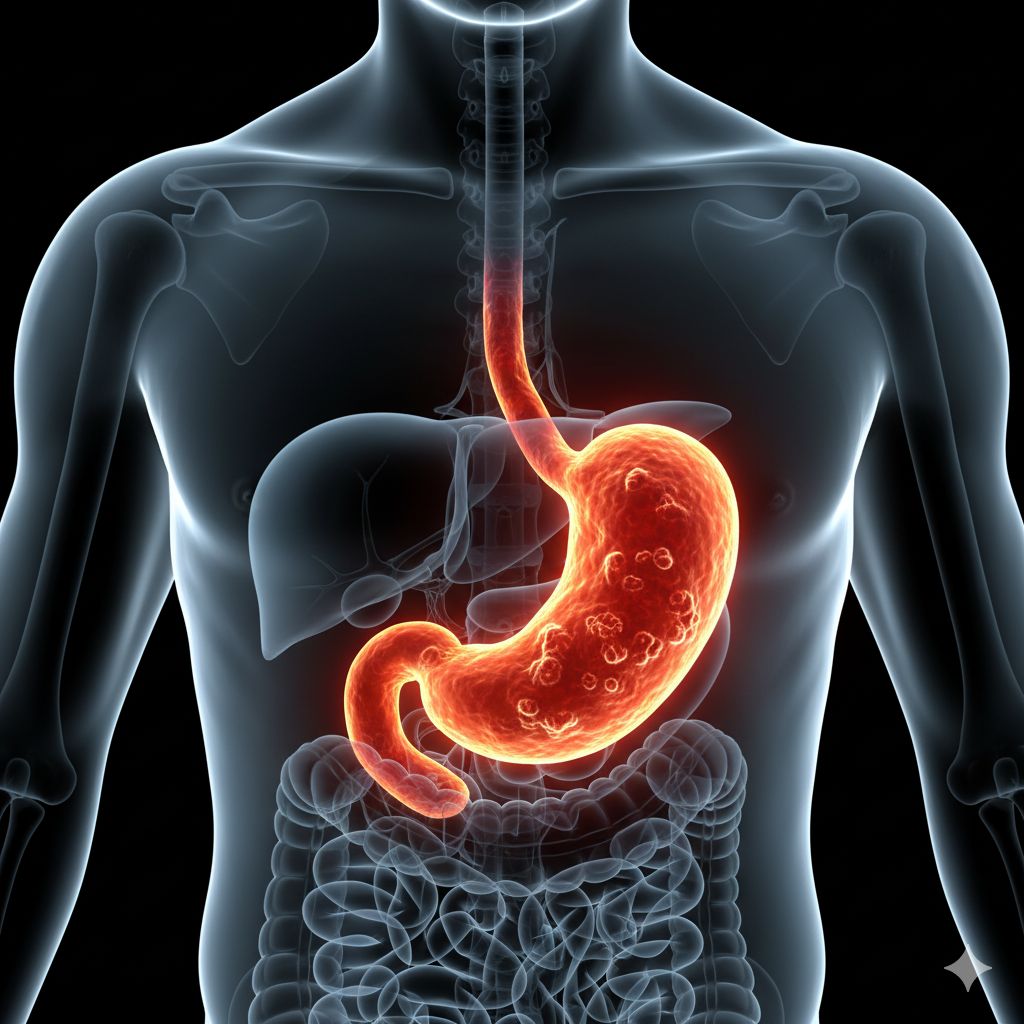Stomach cancer is a serious disease that occurs in the stomach, an essential part of the digestive system. Although the exact cause of stomach cancer is not fully known, many risk factors have been identified that play a role in its development. Being aware of these risk factors and undergoing timely screenings is vital for early diagnosis and improved outcomes.
Stomach Cancer Risk Factors
The development of stomach cancer can be influenced by genetic, environmental, and lifestyle-related factors. Below are some of the most significant risk factors:
- Advanced age and gender: The risk of stomach cancer is higher in men, particularly those aged 72 and older.
- Dietary habits and smoking: Consuming smoked, pickled, heavily salted foods or foods containing high levels of nitrates/nitrites increases the risk. In contrast, a diet rich in fruits and vegetables, high doses of vitamin C, garlic, green tea, and aspirin may have protective effects.
- Helicobacter pylori (H. pylori) infection: This bacterium can cause chronic inflammation in the stomach lining, potentially leading to cancer.
- Previous stomach surgeries: Surgical alterations in the stomach lining may raise the risk.
- Menetrier’s disease: Also known as hypertrophic gastropathy, this rare condition is linked to stomach cancer.
- Chronic atrophic gastritis and pernicious anemia: These chronic conditions that affect the stomach increase cancer risk.
- Blood type A: Individuals with blood type A have a slightly higher risk of stomach cancer.
- Family history: A history of stomach cancer in close relatives increases risk. Hereditary diffuse gastric cancer (HDGC) and mutations in the CDH1 gene (with approximately 50% positivity) are particularly notable.
- Genetic syndromes: Conditions like HNPCC (Lynch syndrome), Li-Fraumeni syndrome, and familial adenomatous polyposis are associated with increased cancer risk.
- Genetic mutations: One of the most frequently observed mutations in gastric cancer is the Cox-2 gene.
Stomach Cancer Symptoms
Stomach cancer often progresses silently and may not cause obvious symptoms in the early stages. Therefore, it is crucial to be aware of the following signs:
- Bloating and indigestion after meals
- Nausea and vomiting
- Unexplained weight loss and loss of appetite
- Fatigue and weakness due to occult (hidden) gastrointestinal bleeding
- Difficulty swallowing or a sensation of food sticking in the throat
- In advanced stages, jaundice and fluid accumulation in the abdomen (ascites)
The Importance of Early Detection in Stomach Cancer
Thanks to advanced endoscopic devices, gastroscopy can detect precancerous gastric lesions at an early stage. When detected early, stomach cancers can be successfully treated using minimally invasive endoscopic techniques without surgery.
Diagnosis of Stomach Cancer
To establish a diagnosis, various methods such as endoscopy, biopsy, computed tomography (CT), and PET scans are used. After diagnosis, a personalized treatment plan is developed by a multidisciplinary tumor board.
Treatment Options for Stomach Cancer
Early-Stage Stomach Cancer
If stomach cancer is diagnosed at an early stage, endoscopic resection techniques (such as EMR or ESD) can be used to remove the tumor. This allows treatment without the need for surgery.
Advanced-Stage Stomach Cancer
In more advanced cases, chemotherapy and/or radiotherapy may be used to shrink the tumor before surgical removal. The main surgical options include:
- Laparoscopic surgery
- Robotic Surgery
- Open Stomach Cancer Surgery
One of the most important factors for successful surgery is the extensive removal of surrounding lymph nodes along with the stomach. This significantly impacts survival rates.
HIPEC (Hyperthermic Intraperitoneal Chemotherapy)
In selected advanced-stage stomach cancer cases, HIPEC involves applying heated chemotherapy directly into the abdominal cavity to reduce tumor burden. This method is typically combined with surgery and should be performed in experienced centers.
Conclusion
Stomach cancer is a disease that often progresses silently but is largely treatable if diagnosed early. Lifestyle changes, regular medical check-ups, and awareness of risk factors are the most effective ways to prevent stomach cancer. Thanks to modern diagnostic and treatment methods, the success rate in managing stomach cancer is steadily increasing.


